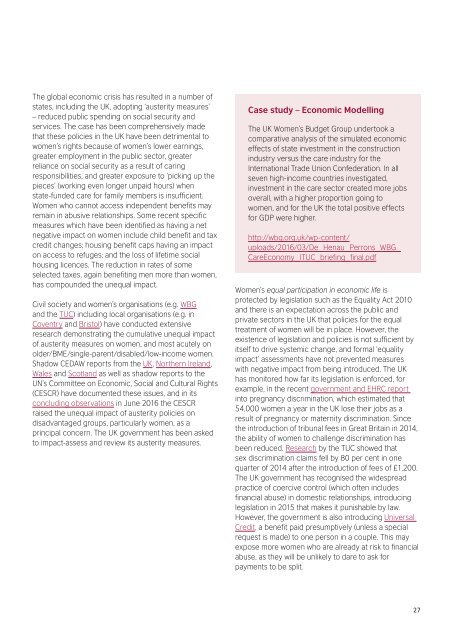GENDER EQUALITY AND EMPOWERMENT OF WOMEN AND GIRLS IN THE UK
gender_equality_an_empowerment_in_the_uk
gender_equality_an_empowerment_in_the_uk
Create successful ePaper yourself
Turn your PDF publications into a flip-book with our unique Google optimized e-Paper software.
The global economic crisis has resulted in a number of<br />
states, including the <strong>UK</strong>, adopting ‘austerity measures’<br />
– reduced public spending on social security and<br />
services. The case has been comprehensively made<br />
that these policies in the <strong>UK</strong> have been detrimental to<br />
women’s rights because of women’s lower earnings,<br />
greater employment in the public sector, greater<br />
reliance on social security as a result of caring<br />
responsibilities, and greater exposure to ‘picking up the<br />
pieces’ (working even longer unpaid hours) when<br />
state-funded care for family members is insufficient.<br />
Women who cannot access independent benefits may<br />
remain in abusive relationships. Some recent specific<br />
measures which have been identified as having a net<br />
negative impact on women include child benefit and tax<br />
credit changes; housing benefit caps having an impact<br />
on access to refuges; and the loss of lifetime social<br />
housing licences. The reduction in rates of some<br />
selected taxes, again benefiting men more than women,<br />
has compounded the unequal impact.<br />
Civil society and women’s organisations (e.g. WBG<br />
and the TUC) including local organisations (e.g. in<br />
Coventry and Bristol) have conducted extensive<br />
research demonstrating the cumulative unequal impact<br />
of austerity measures on women, and most acutely on<br />
older/BME/single-parent/disabled/low-income women.<br />
Shadow CEDAW reports from the <strong>UK</strong>, Northern Ireland,<br />
Wales and Scotland as well as shadow reports to the<br />
UN’s Committee on Economic, Social and Cultural Rights<br />
(CESCR) have documented these issues, and in its<br />
concluding observations in June 2016 the CESCR<br />
raised the unequal impact of austerity policies on<br />
disadvantaged groups, particularly women, as a<br />
principal concern. The <strong>UK</strong> government has been asked<br />
to impact-assess and review its austerity measures.<br />
Case study – Economic Modelling<br />
The <strong>UK</strong> Women’s Budget Group undertook a<br />
comparative analysis of the simulated economic<br />
effects of state investment in the construction<br />
industry versus the care industry for the<br />
International Trade Union Confederation. In all<br />
seven high-income countries investigated,<br />
investment in the care sector created more jobs<br />
overall, with a higher proportion going to<br />
women, and for the <strong>UK</strong> the total positive effects<br />
for GDP were higher.<br />
http://wbg.org.uk/wp-content/<br />
uploads/2016/03/De_Henau_Perrons_WBG_<br />
CareEconomy_ITUC_briefing_final.pdf<br />
Women’s equal participation in economic life is<br />
protected by legislation such as the Equality Act 2010<br />
and there is an expectation across the public and<br />
private sectors in the <strong>UK</strong> that policies for the equal<br />
treatment of women will be in place. However, the<br />
existence of legislation and policies is not sufficient by<br />
itself to drive systemic change, and formal ‘equality<br />
impact’ assessments have not prevented measures<br />
with negative impact from being introduced. The <strong>UK</strong><br />
has monitored how far its legislation is enforced, for<br />
example, in the recent government and EHRC report<br />
into pregnancy discrimination, which estimated that<br />
54,000 women a year in the <strong>UK</strong> lose their jobs as a<br />
result of pregnancy or maternity discrimination. Since<br />
the introduction of tribunal fees in Great Britain in 2014,<br />
the ability of women to challenge discrimination has<br />
been reduced. Research by the TUC showed that<br />
sex discrimination claims fell by 80 per cent in one<br />
quarter of 2014 after the introduction of fees of £1,200.<br />
The <strong>UK</strong> government has recognised the widespread<br />
practice of coercive control (which often includes<br />
financial abuse) in domestic relationships, introducing<br />
legislation in 2015 that makes it punishable by law.<br />
However, the government is also introducing Universal<br />
Credit, a benefit paid presumptively (unless a special<br />
request is made) to one person in a couple. This may<br />
expose more women who are already at risk to financial<br />
abuse, as they will be unlikely to dare to ask for<br />
payments to be split.<br />
27


